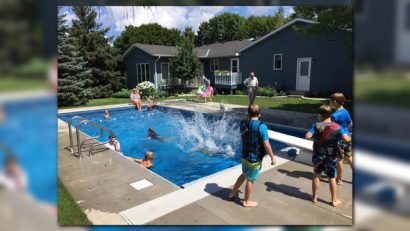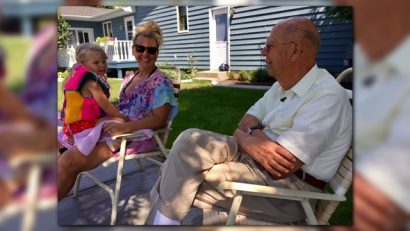Old age can be lonely, and that loneliness can have severe repercussions to our mental health, including memory loss, dementia, and depression. Keith Davidson reached his limit in the months after the death of his wife Evy.
“You just can’t imagine what it’s like,” says Davison, who lost his wife to cancer in 2016 after a marriage of 66 years. “You cry a lot. That’s just the way it is, because she’s not here.”
But if you were to visit Keith today, you would probably be greeted by the sound of laughter and splashing water. Late in the spring of this year, Keith installed an in-ground swimming pool and filled it with the neighborhood children.

“I knew they’d come,” says Davison, laughing.
Not a lot of people believed Keith when he first told them about his idea. His neighbor Jessica Huebner was one of them. “This spring when I saw him marking the yard, I told my husband, he’s really going to put a pool in his backyard.”
Since the pool opened in July, Jessica and her children have become regulars. This is no small pool either; the pool stretches 32 feet long and is 9 feet deep under the diving board. It’s a welcome addition to a neighborhood with no public pool available in the hot summer months.
“Now we’re going to be here every day,” says Jaime Mundal, a neighborhood mom.
Davison has three adult children, but no grandchildren. Huebner says she now tells her neighbor, “’You kind of adopted our whole neighborhood of kids, these are your grandkids.’”

The kids aren’t the only ones enjoying the pool. Keith admits that he enjoys to go for a dip after all the children have gone home for the day.
But if you were to walk into the backyard, you would see Keith sitting in the shade, looking at the joy on the faces of the children. The pool rules require a parent or grandparent be with the children as they swim.
While it may seem strange, from an economic standpoint, for a 94-year old man to install a swimming pool, Keith doesn’t mind. “I’m not sitting by myself looking at the walls,” he smiles.
Fighting Memory Loss
As we get older, a lot of people do find that they are alone. Not only can it be incredibly lonely, it can have severe consequences for our mental health including memory loss and longevity in general.
Our brain in an incredibly complex organ, making everything that we do possible. As we age however, it is important to remember that it needs to be kept active. Studies show that you can help prevent cognitive decline and reduce the risk of dementia by keeping good health habits.
You can do things like staying physically active, getting enough sleep, not smoking, having good social connections, limiting alcohol to one drink a day, and eating a balanced diet low in saturated and trans fats [1].
One of the greatest threats to our cognitive abilities as we age is isolation. As sad as it is, many of the elderly are often cast aside and forgotten, left alone in their old age. This lack of social interaction and mental stimulation is detrimental to their cognitive abilities. Social isolation, aging researchers have discovered, puts people at risk of losing some of the brain reserves they have built up over a lifetime [2].
There are many ways to be social that work very well and don’t require installing a giant pool in your backyard. Volunteering invites you into social situations with all kinds of different people who can create stimulating conversation and flex our brain muscles and fight back against age-related memory loss.
Dr. Anne Fabiny, chief of geriatrics at Cambridge Health Alliance and an assistant professor of medicine at Harvard Medical School, says it is important for those of us on the older side to keep ourselves mentally stimulated and pushing ourselves. “Be open to new experiences that cause you to see the world and do things differently,” she says [2].
3 Ways to Prevent Dementia
If you’re worried about your mental health, longevity, and memory, here are 3 great strategies to stimulate your brain and keep it running like it did when you were in your 20s! [2]
Be A Lifelong Learner
The first half of our lives are spent building dense network connections between brain cells. Scientists call this “cognitive reserve.” Continuing to learn new things builds and maintains these connections, while strengthening old ones.
Strain Your Brain
Imagine all mental activities as a spectrum. Watching a nature documentary would be on the passive end of the spectrum as it is only mildly challenging. Learning a new language would be on the active, challenging end. When it comes to preserving our cognitive resources, challenging tasks have the biggest impact.
Be Bold
One stereotype of aging is that older people are homebodies that ‘know what they like’, while younger generations are bold explorers. While it is a stereotype, it is easy to fall into a routine. Getting out of our comfort zone challenges our mental abilities by placing us in an unfamiliar landscape and forcing us to absorb new information and experiences, strengthening mental connections.
Old age can be lonely, but it doesn’t have to be. Keith Davison shows us that there is more to life than just passing the time. Our time here is meant to be shared and lived to the fullest, each and every day.
- https://www.health.harvard.edu/newsletter_article/preserving-and-improving-memory-as-we-age
- https://www.health.harvard.edu/blog/mental-strain-helps-maintain-a-healthy-brain-201211055495
- http://www.kare11.com/news/local/land-of-10000-stories/94-year-old-puts-in-pool-for-neighborhood-kids/463647743
